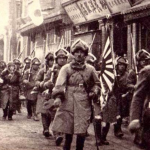As the eyes of the world turn to Chicago for the Democratic National Convention, Microsoft will be across town, warning of a threat to elections across the globe: artificial intelligence.
On Monday, while Democrats from around the country gather at the United Center for the first day of the convention, the tech giant will host a luncheon at The Drake Hotel on the dangers of deepfakes — deceptive images, videos and audio generated using AI.
“This is a global challenge and opportunity,” says Ginny Badanes, general manager of Microsoft’s Democracy Forward Program. “While we’re, of course, thinking a lot about the U.S. election because it’s right in front of us, and it’s obviously hugely consequential, it’s important to look back at the big elections that have happened.”
Badanes says one of the most troubling political deepfake attacks worldwide happened in October in Slovakia just two days before the election for a seat in parliament in the central European country. AI technology was used to create a fake recording of a top political candidate bragging about rigging the election. It went viral. And the candidate lost by a slim margin.
AI also turned up in last year’s Chicago mayoral election. Candidate Paul Vallas, the former Chicago Public Schools chief, was the target of an audio deepfake posted on the social media platform X. In the clip, an artificial but realistic voice purporting to be that of Vallas endorsed rampant police violence, saying: “These days, people will accuse a cop of being bad if they kill one person that was running away. Back in my day, cops would kill, say, 17 or 18 civilians in their career, and nobody would bat an eye.”
Badanes says she hopes the government and technology companies do more to fight the growing threat of deepfakes and to better inform the public.
She says Microsoft’s event at The Drake, 140 E. Walton Place, will be geared toward women, whom she says are disproportionately targeted by deepfakes and also online harassment. The training will focus on spotting deceptive AI content and providing tools to protect against illicit uses of the technology — including how to report a deepfake and how to check whether an image is bogus.
Badanes also will be part of a panel discussion Aug. 21 at the Erie Cafe, 536 W. Erie St., on the intersection of AI and politics, with a focus on regulations to combat deepfakes.
Tools for candidates
Candidates in this year’s U.S. elections who think they’ve been deepfaked can contact Microsoft for help, Badanes says. Microsoft and other tech companies have been working on ways to foil misinformation campaigns by putting permanent labels in photos and videos to help people tell whether they’re authentic, she says.
“We have a free tool,” Badanes says. “We encourage political campaigns to tag all of their official images and videos with this content-integrity marker.”
The training session Monday is being sponsored by All In Together, a nonprofit focused on empowering women. It hosted a similar session at last month’s Republican National Convention in Milwaukee. Badanes says a state representative who attended the RNC told of being bullied online “and expressed some concern that that might turn into something like AI-generated harassment.”
AI already has come into play in the current presidential election. President Joe Biden became a target of satirical, manipulated videos before he abandoned his reelection bid this summer. A fake version of Biden’s voice also was used in a robocall in New Hampshire that prompted criminal charges and a proposed $6 million fine against Steven Kramer, who’s accused of commissioning the deepfake.
A deepfake photo showing the aftermath of last month’s attempted assassination of former President Donald Trump circulated widely online. The image was altered to make it appear that Secret Service agents smiled as they encircled the Republican presidential nominee — apparently an effort to make the shooting appear to be a hoax.
Trump recently said AI had been used to manipulate an image showing a crowd gathered at a Michigan airport to greet his new Democratic rival, Vice President Kamala Harris. He said on Aug. 11 that “nobody” was there when Harris got off Air Force Two, though video footage showed there was indeed a crowd.
Foreign actors, ‘real-world harms’
In a report this month, Microsoft warned that figures in Russia were “targeting the U.S. election with distinctive video forgeries.”
Microsoft also warned in the Aug. 9 report that an Iranian intelligence unit had lodged a cyberattack against “a high-ranking official of a presidential campaign.”
The next day, Trump’s campaign reported that its internal communications had been hacked, blaming Iran for the incursion.
Harris’ campaign has since said it has also been targeted by a foreign influence campaign.
Microsoft said Iran has impersonated activist groups “to stoke chaos, undermine trust in authorities and sow doubt about election integrity.”
Last month, Avril Haines, Biden’s national intelligence director, said: “Iranian government actors have sought to opportunistically take advantage of ongoing protests regarding the war in Gaza, using a playbook we’ve seen other actors use over the years.
“We have observed actors tied to Iran’s government posing as activists online, seeking to encourage protests and even providing financial support to protesters,” Haines said.
The warning came just over a month before thousands of protesters are expected to be in Chicago during the Democratic convention to protest the Israel-Hamas war. The Council on American-Islamic Relations has since called on Haines to release more information about what the Muslim advocacy group termed a “vague, potentially dangerous” claim.
Microsoft said Chinese state actors have also “leveraged hundreds of accounts to stoke outrage around pro-Palestinian protests at U.S. universities,” and Russian web warriors have seized on hot-button issues like U.S. immigration and the country’s war against Ukraine.
“There are real-world harms that are happening due to this technology,” Badanes says. “What I’m focusing on at the [DNC] is around the impact it has on elections, but we’re thinking about these harms in a much broader sense.”
Welton Chang, co-founder of Pyrra Technologies, which researches disinformation and online extremism, says chatter surrounding the convention has grown as the event drew closer, with some people cheering for violence and unrest. But he hasn’t seen telltale signs of foreign influence operations.
Chang says he’ll be watching for foreign actors to seize on and amplify flashpoints during the convention — for instance, latching onto video of any police clashes with protesters.
“I could almost see that in real time happening, where these groups are operating networks of accounts to basically take that video and make it worse than it actually is or just try to bring that story to light,” he says.



